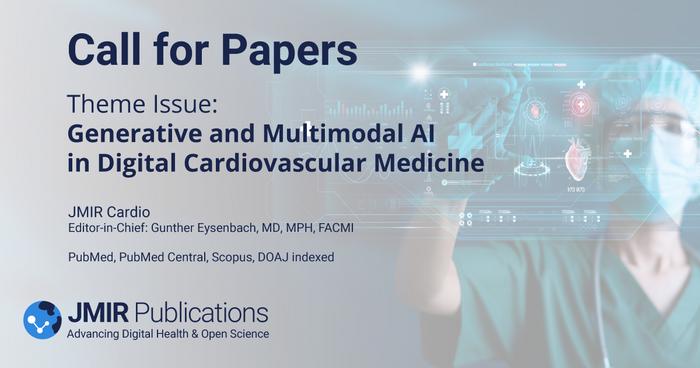Cardiovascular
Call for papers theme issue on generative and multimodal artificial intelligence (AI) in digital cardiovascular medicine
image: Call for Papers Theme Issue on Generative and Multimodal Artificial Intelligence (AI) in Digital Cardiovascular Medicine
view more
Credit: JMIR Publications
JMIR Cardio Editor-in-Chief: Gunther Eysenbach, MD, MPH, FACMI welcomes submissions to a special theme issue examining “Generative and Multimodal Artificial Intelligence (AI) in Digital Cardiovascular Medicine.”
This call for papers aims to explore the potential of generative AI in health care and medicine, specifically in the field of cardiovascular medicine and its subspecialties. This includes, but is not necessarily limited only to, large language models and multimodal AI that can be applied to electrophysiology, congenital heart diseases, transplant cardiology, and precision cardiology.
Submissions may address topics such as automated disease prevention, risk prediction or stratification, cardiovascular diagnosis and monitoring, cardiovascular imaging, personalized care or treatment, care planning and management, drug discovery, and event detection. We especially welcome original paper submissions that robustly examine the comparative effectiveness of generative AI technologies applied to cardiovascular disciplines, or viewpoints that offer a well-argued and evidence-based contrary view of generative AI applications in cardiovascular medicine. To be considered for publication in the special issue, authors must provide evidence of the relevance of their research to the topic of this call for papers.
Submissions are invited on, but not limited to, the following topics:
- Applying AI, including generative AI and multimodal or large language models, to enhance cardiovascular testing and imaging, assist in diagnosis and treatment, and aid with the development and monitoring of care management plans
- Applying AI to improve risk stratification and prediction of cardiovascular events, including focusing on sex- and gender-based differences in cardiovascular diseases or maternal and perinatal cardiovascular health
- Delivering personalized, accessible cardiac care using AI-powered chatbots
- Applying AI to improve patient engagement or adherence and health care outcomes in cardiac rehabilitation, post-stroke rehabilitation, and rehabilitation after cardiovascular-related procedures
- Generative AI, multimodal or large language model technologies for cardiovascular disease knowledge representation and reasoning, including the use of knowledge graphs and semantic web technologies to store and process large amounts of structured and unstructured data
- Neural machine translation to generate natural language responses from structured cardiovascular pharmacologic, physiologic, medical, and clinical data
- AI-driven computer vision algorithms applied to all forms of cardiovascular testing and imaging, including but not limited to electrophysiologic testing, echocardiograms, computed tomography, magnetic resonance imaging, nuclear imaging, and other types of novel cardiovascular imaging
- Detecting and analyzing cardiovascular events in real time using mobile, wearable, or environmental sensor data
- Improving clinical workflows and care pathways using generative or AI technologies based on organizational data, medical or insurance claims data, or other large health care datasets
- Accelerating drug discovery and finding new therapeutics using generative AI
- Ethic, legal, and social issues and implications for clinical applications of generative AI technologies in cardiovascular care
- Limitations and challenges of applying generative AI technologies to cardiovascular health and medicine, including structural or systemic bias, health disparities, marginalization of patient populations who are routinely underrepresented, and secondary use of data or algorithms
- Need for data infrastructures, data security and regulations, and applicable principles (eg, FAIR guiding principles) to enable generative AI applications in routine cardiovascular care
- Viewpoints on the future of AI-driven digital cardiovascular health care and medical practices.
The deadline for submissions is September 30, 2023. All accepted manuscripts will be published as part of the JMIR Cardio special theme issue on “Generative and Multimodal AI in Digital Cardiovascular Medicine.”
To learn more please visit: https://cardio.jmir.org/announcements/395
###
About JMIR Publications
JMIR Publications is a leading, born-digital, open access publisher of 30+ academic journals and other innovative scientific communication products that focus on the intersection of health and technology. Its flagship journal, the Journal of Medical Internet Research, is the leading digital health journal globally in content breadth and visibility, and it is the largest journal in the medical informatics field.
To learn more about JMIR Publications, please visit https://www.JMIRPublications.com or connect with us via Twitter, LinkedIn, YouTube, Facebook, and Instagram.
Head office: 130 Queens Quay East, Unit 1100, Toronto, ON, M5A 0P6 Canada
Media contact: [email protected]
Disclaimer: AAAS and EurekAlert! are not responsible for the accuracy of news releases posted to EurekAlert! by contributing institutions or for the use of any information through the EurekAlert system.

